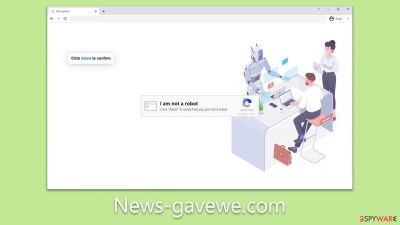News-gavewe.com ads (fake) - Tutorial
News-gavewe.com ads Removal Guide
What is News-gavewe.com ads?
News-gavewe.com – a fake website created by scammers to manipulate visitors into subscribing

News-gavewe.com is a deceitful website designed with the explicit purpose of misleading unsuspecting internet users. This URL becomes noticeable to many as they experience unwanted pop-ups that materialize without explicit triggers or visiting particular websites. Such unanticipated notifications are a consequence of earlier authorized push notifications, all constituting elements of a well-orchestrated scam.
Individuals usually find themselves on News-gavewe.com either by inadvertently clicking on a malicious link provided by an unreliable source or through redirects caused by adware. Many users do not immediately identify the irregularity, often mistaking it for a routine security verification. Regardless of the way users land on this deceptive page, maintaining vigilance during online navigation is imperative.
When users click the “Allow” button on the push notification, they unwittingly grant News-gavewe.com permission to send push notifications at will. It's crucial to understand that these notifications will only be sent when the browser is open and functional. Moreover, it should be noted that there are effective means available for users to halt and remove these intrusive pop-ups, which will be outlined subsequently.
| Name | News-gavewe.com |
| Type | Push notifications, ads, pop-ups, scam |
| Distribution | Intrusive pop-ups can start showing up at some point after the “Allow” button is pressed within the notification prompt |
| Symptoms | Pop-ups show up on a regular basis on the screen – these ads often include inappropriate, scam, phishing, or other similar content |
| Risks | The ads shown within push notifications might include misleading messages and links to malicious websites. If clicked, you might end up infecting your system with malware, disclosing your personal information, or losing money |
| Removal | Push notifications can be stopped by blocking the web address of the malicious website via browser settings. Checking the device with SpyHunter 5Combo Cleaner security software is also recommended |
| Repair & tips | Remove caches and other web data to prevent data tracking – use the FortectIntego repair and maintenance tool. You can also repair damaged system components with it |
Accidental click might land you on fake websites
Most individuals typically stumble upon websites like News-gavewe.com inadvertently. In fewer instances, repeated redirection to such sites may indicate an adware or malware infection on the user's device. Understanding the common ways through which users access these sites and adhering to precautionary measures is fundamental to avoiding falling victim to these scams.
Accidental access usually happens when users click on dubious links that may appear legitimate or enticing, found in emails, social media posts, or online advertisements. These links are often disguised, leading the user unknowingly to the scam site. Unsuspecting users might also land on these sites while visiting other legitimate but compromised websites that have been infiltrated by cybercriminals to redirect traffic to the scam.
In rarer cases where the user's device is infected with adware or another form of malware, the redirection to sites like News-gavewe.com occurs without any action on the part of the user. Malware often gets installed stealthily through free software bundles, deceptive ads, or infected email attachments, leading to unauthorized redirects, pop-ups, and other intrusive behavior.
To avoid falling prey to News-gavewe.com and similar push notification scams:
- Exercise caution when clicking on links, especially those received via email or found on social media, and verify their legitimacy.
- Install and regularly update security software to protect against malware and adware.
- Avoid downloading software from unofficial or suspicious websites, as these may bundle malicious programs with legitimate ones.
- Regularly update your browser and operating system to patch any security vulnerabilities.
- Implement ad-blockers or browser security extensions to minimize the risk of encountering malicious ads and redirects.
- Practice discernment with online prompts and notifications, denying requests that seem unnecessary or suspicious.
Following these tips can significantly diminish the risk of inadvertently accessing scam sites and becoming a victim of their deceptive practices.
Scammers use deceit
The fact that users end up on push notification websites unintentionally only enhances the ability of scammers to mislead them through craftily designed prompts that coax users into activating notifications. For example, a deceptive message users might see upon arrival at News-gavewe.com reads:
Press Allow if you are not a robot
This message cunningly mimics standard bot verification procedures that many legitimate websites utilize as security measures to prevent DDoS attacks. The deceptive simplicity and familiarity of this request make users more likely to follow the instructions unwittingly.

Scammers employ additional manipulation techniques to deceive users further. For instance, they might insinuate that enabling notifications is necessary to allow video playback or to verify the user’s age, both of which are conventional features often associated with online security protocols. By exploiting users’ trust and their familiarity with standard security prompts, scammers trick users into activating malicious push notifications.
Once enabled, these malicious notifications exploit legitimate browser API functionalities, turning them into tools for executing the scam. The exploitation of legitimate APIs allows scammers to send unsolicited advertisements and possibly even malicious links directly to the user's device, further increasing the risk of malware infection and personal data theft.
Removal of unwanted ads and additional checks
To halt push notifications stemming from malicious sites like News-gavewe.com, it’s essential first to ensure that your system is devoid of adware or any other malware infections, as these are often the primary reasons users are redirected to phishing sites. Adware is notorious for employing deceptive tactics that render it difficult to identify and remove.
Initiate the process by running a comprehensive scan of your system using trustworthy security software. Reliable security applications, such as SpyHunter 5Combo Cleaner or Malwarebytes, are designed to efficiently identify, isolate, and eliminate various forms of malware, including adware, providing a robust defense against potential security threats. Consider utilizing a specialized cleaning tool FortectIntego to thoroughly clean your browsers, remove unnecessary files, and address issues emerging from malware infections or other problems.
After safeguarding your system by removing all threats, the next step involves permanently stopping intrusive pop-ups originating from News-gavewe.com. Proceed by following the detailed instructions provided in the subsequent section, which will guide you through effectively disabling these unwanted notifications.
Google Chrome
- Open the Google Chrome browser and go to Menu > Settings.
- Scroll down and click on Advanced.
- Locate the Privacy and security section and pick Site Settings > Notifications.
- Look at the Allow section and look for a suspicious URL.
- Click the three vertical dots next to it and pick Block. This should remove unwanted notifications from Google Chrome.
![Stop notifications on Chrome PC 2 Stop notifications on Chrome PC 2]()
Google Chrome (Android)
- Open Google Chrome and tap on Settings (three vertical dots).
- Select Notifications.
- Scroll down to the Sites section.
- Locate the unwanted URL and toggle the button to the left (Off position).
![Stop notifications on Chrome Android Stop notifications on Chrome Android]()
Mozilla Firefox
- Open Mozilla Firefox and go to Menu > Options.
- Click on Privacy & Security section.
- Under Permissions, you should be able to see Notifications. Click the Settings button next to it.
- In the Settings – Notification Permissions window, click on the drop-down menu by the URL in question.
- Select Block and then click on Save Changes. This should remove unwanted notifications from Mozilla Firefox.
![Stop notifications on Mozilla Firefox 2 Stop notifications on Mozilla Firefox 2]()
Safari
- Click on Safari > Preferences…
- Go to the Websites tab and, under General, select Notifications.
- Select the web address in question, click the drop-down menu and select Deny.
![Stop notifications on Safari Stop notifications on Safari]()
MS Edge
- Open Microsoft Edge, and go to Settings.
- Select Site permissions.
- Go to Notifications on the right.
- Under Allow, you will find the unwanted entry.
- Click on More actions and select Block.
![Stop notifications on Edge Chromium Stop notifications on Edge Chromium]()
Internet Explorer
- Open Internet Explorer, and click on the Gear icon at the top-right of the window.
- Select Internet options and go to the Privacy tab.
- In the Pop-up Blocker section, click on Settings.
![Stop notifications on Internet Explorer Stop notifications on Internet Explorer]()
- Locate the web address in question under Allowed sites and pick Remove.
How to prevent from getting adware
Access your website securely from any location
When you work on the domain, site, blog, or different project that requires constant management, content creation, or coding, you may need to connect to the server and content management service more often. The best solution for creating a tighter network could be a dedicated/fixed IP address.
If you make your IP address static and set to your device, you can connect to the CMS from any location and do not create any additional issues for the server or network manager that needs to monitor connections and activities. VPN software providers like Private Internet Access can help you with such settings and offer the option to control the online reputation and manage projects easily from any part of the world.
Recover files after data-affecting malware attacks
While much of the data can be accidentally deleted due to various reasons, malware is one of the main culprits that can cause loss of pictures, documents, videos, and other important files. More serious malware infections lead to significant data loss when your documents, system files, and images get encrypted. In particular, ransomware is is a type of malware that focuses on such functions, so your files become useless without an ability to access them.
Even though there is little to no possibility to recover after file-locking threats, some applications have features for data recovery in the system. In some cases, Data Recovery Pro can also help to recover at least some portion of your data after data-locking virus infection or general cyber infection.






